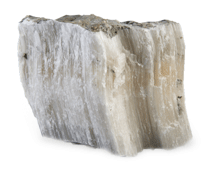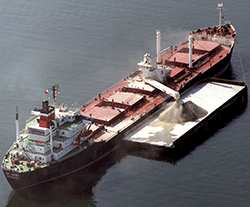AN INDUSTRY LEADER... AT COMPETATIVE PRICING!
WHY SETTLE FOR LESS CARBON, FOR A HIGHER PRICE??
Guaranteed Fixed Carbon > 99.5%
Call us: 1-306-634-1917
MATERIAL PRODUCTS


GENUINE OXBOW
PRODUCTS
Oxbow is a worldwide supplier of numerous industrial materials, each critical to the production of a variety of products. From production and sourcing, to handling and logistics, to technical support, Oxbow plays an important role in the manufacture of such critical materials as aluminum, steel, glass, wallboard and cement.
Oxbow believes that primary industrial materials provide the backbone of economic growth worldwide. Everything from housing and construction to transportation and agriculture relies on industrial materials made available by Oxbow's contributions.
Calcined Petroleum Coke is a critical ingredient in the production of aluminum. It is created by placing high quality raw "green" petroleum coke into rotary kilns, where it is heated to temperatures between 1200 to 1350 degrees C (2192 to 2460 F). The high temperatures remove excess moisture, extract all remaining hydrocarbons and modify the crystalline structure of the coke, resulting in a denser more electrically conductive product. In a matter of hours, calcined petroleum coke is cooled from 1350 degrees C to less than 200 degrees C, when it can be safely handled and transported to storage silos or placed directly into shipping containers, trucks, railcars, barges or vessels.
Calcined petroleum coke has a sponge-like structure which plays an important role in the making of anodes. The pores allow binding material to penetrate through the coke particles and form a solid carbon block, through which aluminum smelters conduct electricity into their smelting pots. Over time, the anodes are consumed, roughly at the rate of 40 tons of calcined petroleum coke for each 100 tons of aluminum produced. Currently, there is no known commercially viable substitute for calcined petroleum coke in the fabrication and utilization of aluminum smelter anodes.
The majority of Oxbow Carbon's calcined petroleum coke finds its way into the primary aluminum industry; another large segment is used in the steel industry as a recarburizing agent. Other uses include the production of titanium dioxide, which is used as a pigment for paint, plastics, sunscreens, and food coloring.
CPC's strength, density and size makes it ideal for the production of:
-
Aluminum
-
Graphite electrode
-
Steel
-
Titanium dioxide
-
Cathodic Protection and A.C Mitigation Backfill
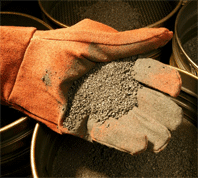

Teck Data Sheets - Most Commonly Used however we can screen size to meet any specification upon request
Oxbow Carbon LLC purchases, screens and distributes more than a million tons of metallurgical coke annually. Oxbow distributes metallurgical coke sourced from China, Colombia, Europe and the United States to companies throughout Asia, the Americas, and Europe.
What is Metallurgical Coke?
Metallurgical coke is made from low ash, low sulfur bituminous coal, with special coking properties, which is inserted into ovens and heated to 1000F to fuse fixed carbon and inherent ash and drive off most of the volatile matter. The final product is a nearly pure carbon source with sizes ranging from basketballs (foundry coke) to a fine powder (coke breeze).
Processing....
Metallurgical coal is used in the production and purification of metallurgical coke. It is during the heating process that the unstable components are released. The final product is a non-melting, solid, stable carbon. However, the "ash" elements, which were part of the original bituminous coal, remain encapsulated in the resultant met coke. One attribute of met coke is its ability to burn while producing little or no smoke. Oxbow Carbon LLC obtains high quality metallurgical coke from China, Colombia, the United States, and various European countries.
End Uses
Met coke is used in products where a high quality, tough, resilient carbon is required. Met coke, limestone, and iron ore are mixed together in high temperature furnaces where extreme heat causes the chemical properties to bond, forming iron and steel. More than 95 percent of the met coke produced is used in the iron and steel industries.
Metallurgical coke is used in products such as:
-
Iron
-
Steel
-
Drilling applications
-
Conductive flooring
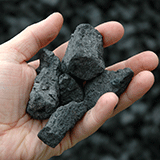
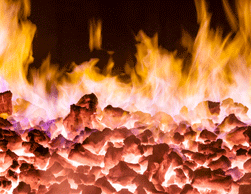
Activated carbon is a highly engineered product used in a variety of environmental applications, including air purification, water treatment and numerous medical and consumer products.
Activated carbon is produced by charring certain types of carbon-containing materials, such as wood, coal, biomass and nut shells and then "activating" it by exposing it to high temperature steam or certain chemicals. Much like a kernel of popcorn, initially small and dense but later large and porous, once activated, specialty carbons can possess very large surface areas for a given volume of material. In some cases, as little as a teaspoon of activated carbon can possess as much surface area as an entire football field. Further, the surface area of the activated carbon contains many pores of varying sizes. Certain pollutants are naturally captured by the pores in activated carbon, allowing this material to serve as an effective filter of airborne and waterborne pollutants.
Some raw carbons, when activated, have widely varying characteristics, and are therefore suitable for different applications. Granulated, powdered and pelletized activated carbons are used for such diverse purposes as filtering municipal and household water supplies, de-odorizing, de-colorizing edible oils, soft drinks and pharmaceuticals, reducing mercury emissions from power plants and supplying the filters on gas masks.
Oxbow sources different activated carbon products from a number of countries, delivering millions of pounds of material each year.
For more information, go to www.OxbowActivatedCarbon.com
Activated carbon is used in a wide range of industrial applications, including:
-
Water purification
-
Gas
-
Food & feed
-
Chemicals
-
Catalysts
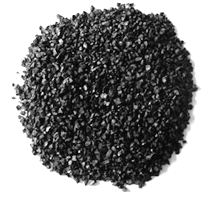
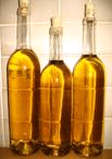
Overview
Not all gypsum produces the same high quality drywall and cement. Knowing the difference between inferior and high quality is just one of the reasons our customers trust Oxbow to deliver their product. As the worlds's largest distributor of Mexican gypsum, we ship primarily to the Pacific Northwest, Western Canada, and California in self-unloading vessels and barges.
What is Gypsum?
Gypsum is the common name for a mineral compound known as calcium sulphate dihydroxide. This mineral is found underground, often near deposits of limestone or other minerals, which are formed by evaporation. To reduce the moisture content found in gypsum it is routinely heated and the resulting powder is often called burnt gypsum. Although its color is usually white, gypsum comes in many hues including pink, gray, off-white, cream, brownish and white. It also comes in a variety of forms, including a pure white crystal called alabaster, and a crystal that forms in desert terrain resembling petals of a flower. Gypsum is naturally resistant to fire and heat.
To address environmental impacts, we dedicate considerable time and effort to fit dust suppression systems on all of our gypsum vessels.
Oxbow Energy Solutions LLC ships high quality gypsum that will be used in products for homes and businesses throughout the West Coast and Canada.
End Uses
Gypsum is primarily used in the production of dry-wall and Portland cement. It is also an important additive for soil amendment. The benefits for farmers using agricultural gypsum include reduction of nitrogen loss to the air, increased nutrient availability in the soil and improved water retention and drainage, with no effect on soil pH levels. Gypsum's versatility also makes it ideal for use in a wide range of smaller applications such as a mild abrasive in toothpastes.
Uses of gypsum:
-
Drywall
-
Cement
-
Soil strengthener
-
Molding agent - Plaster of Paris
